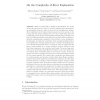Free Online Productivity Tools
i2Speak
i2Symbol
i2OCR
iTex2Img
iWeb2Print
iWeb2Shot
i2Type
iPdf2Split
iPdf2Merge
i2Bopomofo
i2Arabic
i2Style
i2Image
i2PDF
iLatex2Rtf
Sci2ools
VMCAI
2005
Springer
2005
Springer
On the Complexity of Error Explanation
When a system fails to satisfy its specification, the model checker produces an error trace (or counter-example) that demonstrates an undesirable behavior, which is then used in debugging the system. Error explanation is the task of discovering errors in the system or the reasons why the system exhibits the error trace. While there has been considerable recent interest in automating this task and developing tools based on different heuristics, there has been very little effort in characterizing the computational complexity of the problem of error explanation. In this paper, we study the complexity of two popular heuristics used in error explanation. The first approach tries to compute the smallest number of system changes that need to be made in order to ensure that the given counter-example is no longer exhibited, with the intuition being that these changes are the errors that need fixing. The second approach relies on the observation that differences between correct and faulty ...
Related Content
| Added | 28 Jun 2010 |
| Updated | 28 Jun 2010 |
| Type | Conference |
| Year | 2005 |
| Where | VMCAI |
| Authors | Nirman Kumar, Viraj Kumar, Mahesh Viswanathan |
Comments (0)

